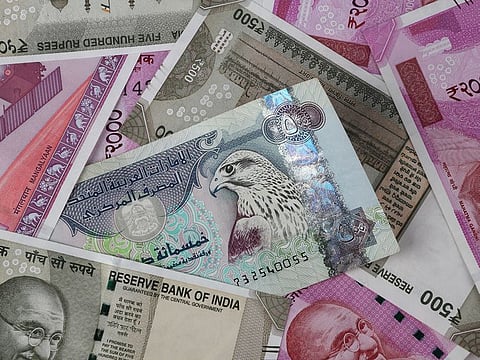How UAE-India currency deal will help businesses in both countries
Lower costs, boost manufacturing, and bilateral gains for both, say business leaders

Dubai: The latest agreement between the UAE and India to allow businesses in the two countries to invoice and pay for goods and services in their domestic currencies - the Indian rupee (INR) and the UAE dirham (AED) - will have a far reaching impact on the trade and manufacturing sectors in both countries, experts have said.
A second MoU to interlink the two countries’ payment systems (UPI and IPP) was also signed during Indian Prime Minister Narendra Modi’s recent visit to Abu Dhabi.
The deals will play a significant role in achieving the targets set by the India-UAE Comprehensive Economic Partnership Agreement (CEPA), which aims to boost bilateral trade to $100 billion in the next five years, strengthening supply chains.
Investments will experience significant growth as investors now have the opportunity to access and utilize both currencies to finance economic frameworks and development in both countries.

Faizal Kottikollon, Chairman of KEF Holdings and of the UAE- India Business Council – UAE Chapter (UC), called the pact ‘groundbreaking’ for several reasons.
“I foresee this to have ripple effects in the larger subcontinent and Middle East region,” he said.
The UPI and IPP integration and interlinking of both countries’ card switches will safeguard traders on the micro level by hedging the exchange rate risk and reducing transaction cost and settlement time.

How will it help trade transactions?
The deal’s impact will help overcome a major bottleneck in trade transactions, said Adeeb Ahamed, Managing Director, Lulu Financial Holdings.
It is a strategic game changer. It would lower the pressure on local currencies and encourage greater exports between the two countries to cross the $100 billion mark faster than expected.

Kami Viswanathan, FedEx Express Senior Vice-President of Middle East, Indian Subcontinent and Africa Operations, said, “The deal eliminates the need for multiple currency conversions and associated transaction costs, resulting in significant cost savings and enhancing the competitiveness of products.”
In addition, she explained that integrating payment systems streamlines cross-border transactions, expedites the payment process, and grants businesses quicker access to funds.
The increased efficiency facilitates smoother trade operations and strengthens the market access for Indian exporters, as it creates a framework that opens opportunities for India-based businesses to expand their exports through the UAE.
During the UAE and India Comprehensive Economic Partnership Agreement (CEPA) implementation period, there has been an 8.5 per cent growth in India’s exports to the UAE - increasing from $26.2 billion to $28.5 billion.
The gems and jewellery sector has grown exponentially since the CEPA signing.
As this momentum continues, we anticipate parallel growth trajectories in other Indian sectors, such as healthcare and automotive

How will it help tourists?
The linking of the UPI and IPP systems will boost the local economies of both nations and give a fillip to the two countries' tourism aspirations. "Tourists to both countries will be able to leverage the benefits of the proposed partnership to use their respective domestic payment apps and local cards to pay for services, tickets, travel expenses, food, and local merchant purchases, as well as withdraw money without incurring higher transaction fees that are presently levied by external payment networks," said Ahamed of Lulu Financial Holdings. Meanwhile, Khalil Alami, Founder and CEO of Telr, a payment gateway provider, said, "Many providers stand ready to support businesses and travellers in both countries, taking advantage of this development to streamline their payment processes for individuals and entities alike."
We look forward to this conjunction considering the rapid increase in Indian consumers in the UAE, and I have no doubt that this will open many doors for us.

Boost in manufacturing
A boost in manufacturing capabilities is also on the cards. Dilip Sinha, Vice President of Middle East and India, nVent Inc., and former Secretary General of the Indian Business and Professional Council said, “There is a huge incentive for international companies to set up their manufacturing units in India and export to the UAE and other Middle Eastern nations (via the UAE) once the deal is ratified.”
Many companies are already manufacturing in India, but with the Make it in India initiative, the deal could help several international agri-businesses, pharma, jewellery, textiles, machinery spare parts, and FMCG firms set up production units in India.

On the energy front, there is already a big participation from companies like Larsen and Turbo and Tata Steel. “Electrical products manufactured in India are finding a huge market internationally. With the reduction in transaction costs, these sectors have a higher incentive to create a trade channel for their goods and services,” Sinha added.
Will the deal help create new jobs?
As bilateral trade increases sharply thanks to this new partnership, more investment will flow between the two countries as trade outposts and logistics and manufacturing hubs are built to cater to the increasing demand, predicts Ahamed.
“This will significantly increase jobs and pave the way for more economic growth on both sides while helping unlock opportunities in new sectors. This will also encourage greater FDI and increase the scope for collaborations through easier trade financing,” he said.
SMEs to gain from the deal?
The deal would also attract a larger number of Indian companies who are not doing business in the UAE. “The deal provides a greater scope for small and medium business enterprises. The huge transactional costs upset the budgets of most companies, especially due to exchange rate volatilities. Once that hurdle is removed, more Indian businesses would consider setting up a second base in the UAE,” said Sinha.



